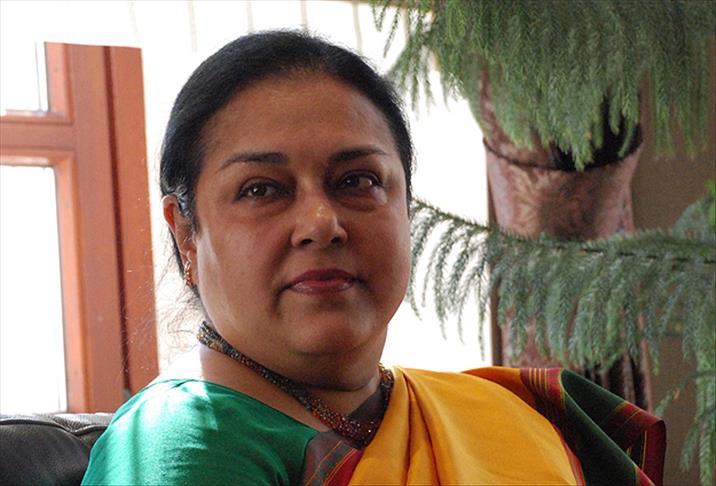
ANKARA (AA) - August 27, 2012 - India's ambassador in Ankara has said that her country was working on to explore possibilities of improving of relations between Turkey and India.
Susmita G. Thomas spoke to The Anadolu Agency in an exclusive interview about India's economic growth, the country's permanent membership process at the Security Council, bilateral relations with Turkey, China and Israel, and India's stance over the ongoing violence in Syria.
Thomas highlighted that Turkish-Indian relations have always been very strong since the medieval times when there were powerful trade ties in the region.
The ambassador said the seed capital for the Turkey's Is Bankasi was received from India, which she said was not a well known fact.
"Turkish-Indian relations have always been warm. From the economic point of view, the bilateral trade volume was $493 million in 2000, and in 2011, it climbed over $7 billion. There is a large number of items that India exports to Turkey and equally a large number of items that India imports from Turkey," she said.
Indian ambassador said that the relations are increasing and developing, adding that both countries were members of G-20, and developing economies which can weather the world economic crisis much better than any other developed country.
When asked if India prepared any action plan to develop economical and trade relations with Turkey, Thomas said, "we are exploring the possibilities of taking our entire gamut of political, social and human interactions including in sports and youth affairs to much greater heights."
-Global power or regional power
India has the second largest population in the world with 1.2 billion people. Also, with its rich history and policies that support strong growth, India has been playing lately an active role in G-20, BRIC and WTO.
When asked if India was "a global power" or "a regional power," she said India had never sought to become either a world power or a regional power.
"We have never sought territorial acquisitions nor attacked any other country in order to increase our wealth, territory or to gain power. What we have always worked for was to a have balanced, equitable global development, peace and stability within the country, peace and cooperation with the neighbours."
Thomas said India was a member of the South Asian Association for Regional Cooperation (SAARC) which promoted greater trade and economic activity between members to develop their full potential, adding that India had always kept close relations with other members.
"All our neighbouring countries are members to SAARC and we have worked incessantly to increase economic and trade cooperation between all the countries," she said.
Thomas added that India was named by the United Nations (UN) the "third favoured nation" for foreign institutional investors after US and China.
Thomas said India harboured a wide range of cultures, languages and ethnic groups, and that the country had the world's third largest army, and lately it has been a global leader in information technologies.
-India, China target $100 billion by 2015 in trade
Touching on India's economic growth and its relations with China, the ambassador said despite a historical mistrust, India and China have been developing good relations lately.
"And the two countries have mechanisms in place to deal with contentious issues, border disputes and to handle the residual mistrust," she said.
The ambassador also said China was India's largest trading partner and both sides had agreed to set a new target of $100 billion for the bilateral trade by 2015, and that the two countries cooperated at the international summits such as G-20, WTO and UN over international and regional issues, as well as global financing and climate change.
In 2011 trade between India and China totalled $74 billion.
-India's permanent membership process in UNSC
Asked if India would become a permanent member of the United Nations Security Council, Thomas stressed that India represented a large part of the world's population and her country should have a say in the Council.
"The world has changed a lot in the past 65 years. We have one sixth of the world's population. We believe that we should have a voice in the functioning of the Security Council. As a newly independent country, we represent this large segment of the world and that we should have a voice in the UN and its organs particulary in the Security Council for the newly emerging and developing countries which have fresh experiences," she said.
Thomas said India had contributed nearly a hundred thousand troops to 35 separate UN peace keeping missions in four continents, adding, "we have put a claim to be a permanent member of the UNSC. For that to happen, there has to be a basic acceptance by the world body that there is need for reform to its set-up and inclusion of the other developing countries that have emerged in the last 50 years."
-Robust relations of India and Israel
The ambassador stated that more Israelis visited India each year, and historical ties between the two nations had led them to develop cordial and mutually beneficial relations. She added that India and Israel worked closely in the fields of trade, economy and technology importation.
-Peace for Syria
Asked about India's point of view about the ongoing violent attacks and the current situation in Syria, Thomas said since the beginning of the uprising, India had focused on the condemnation of all violence, the encouragement of a peaceful political process, and ensuring that Syria itself would decide on an egalitarian system.
"India believes that the leadership of Syria is a matter for the people of Syria. We wish the Syrian people live in peace and prosperity."
Reporting by Inci Gundag
Anadolu Agency website contains only a portion of the news stories offered to subscribers in the AA News Broadcasting System (HAS), and in summarized form. Please contact us for subscription options.







